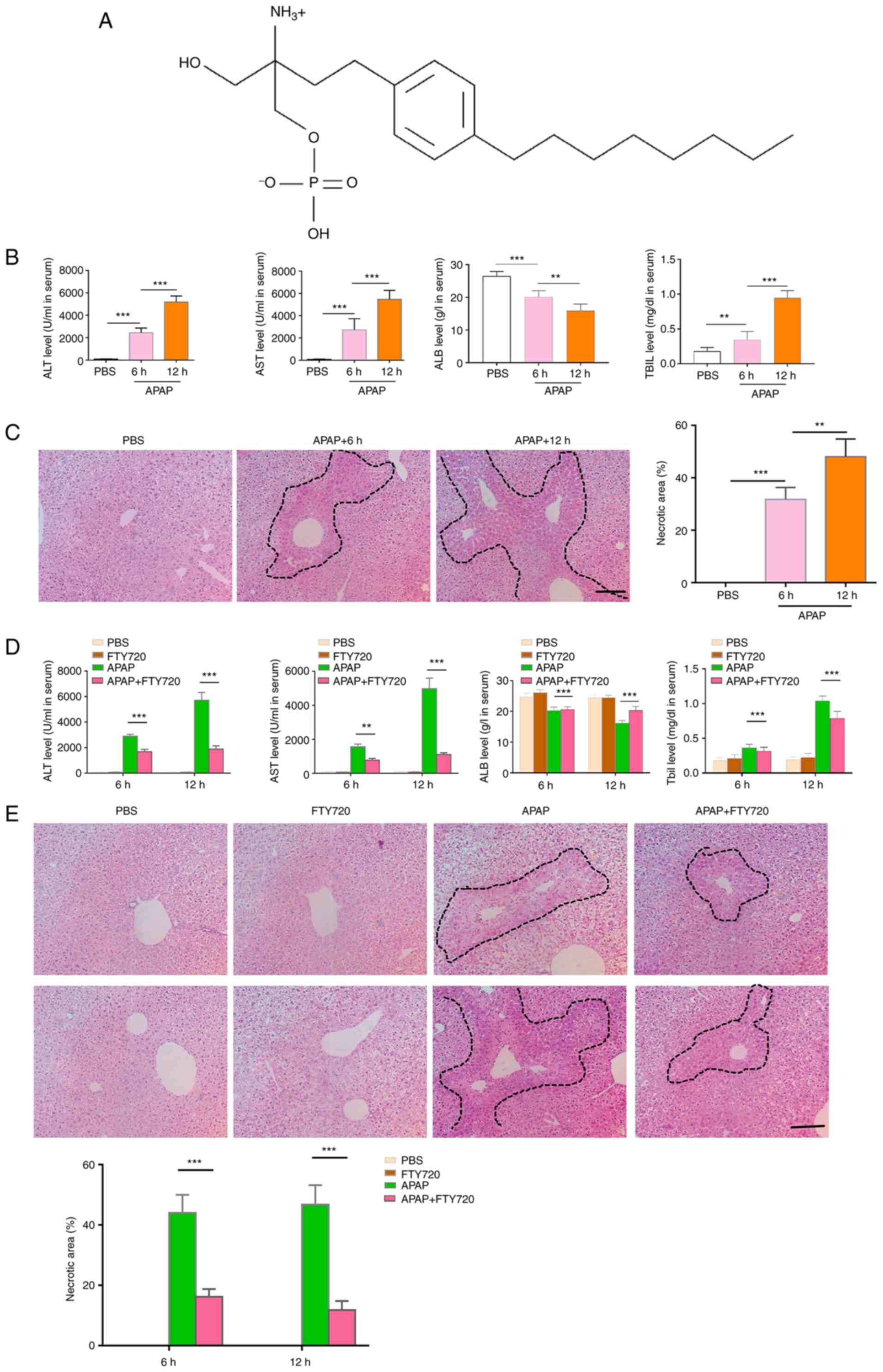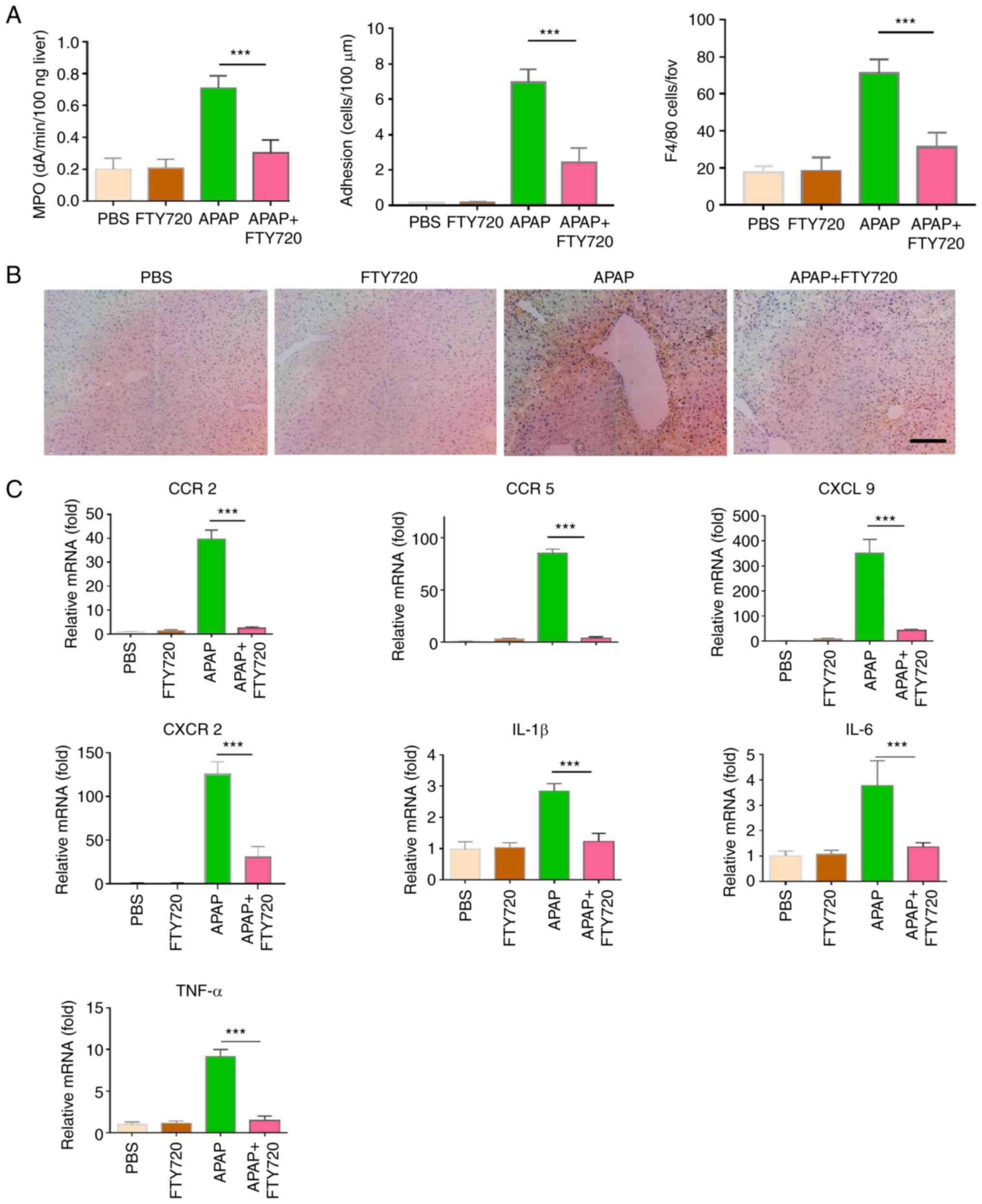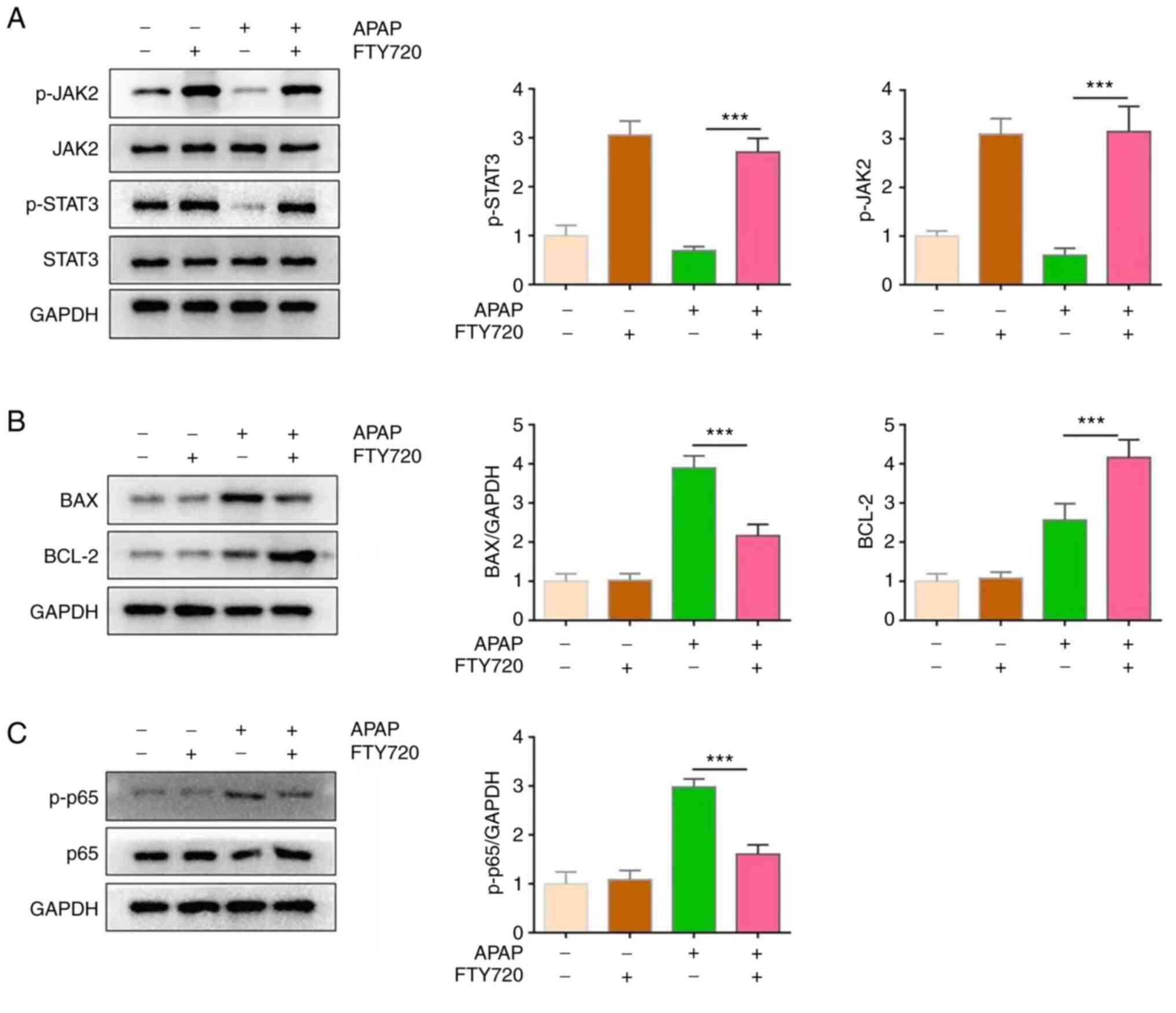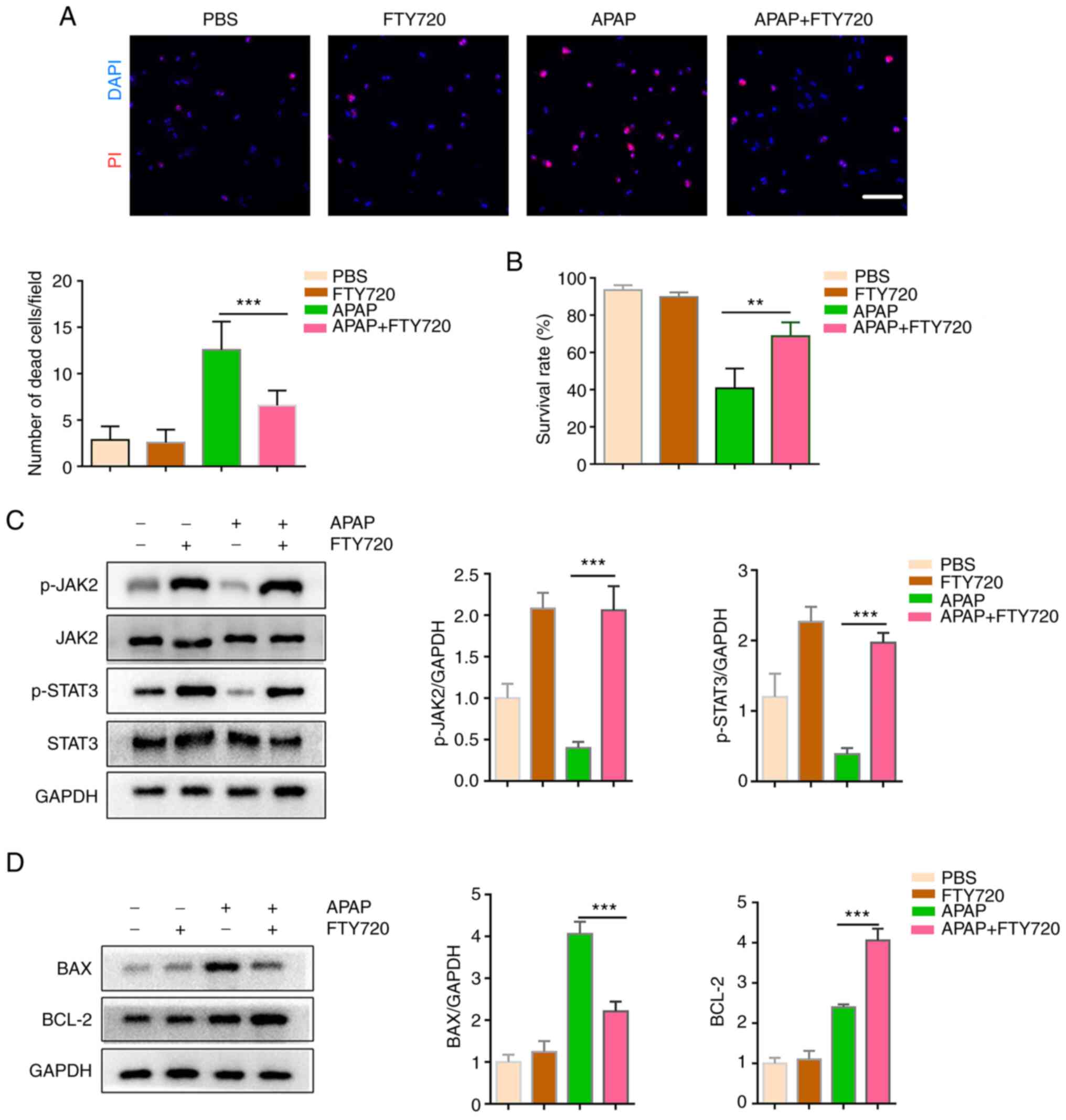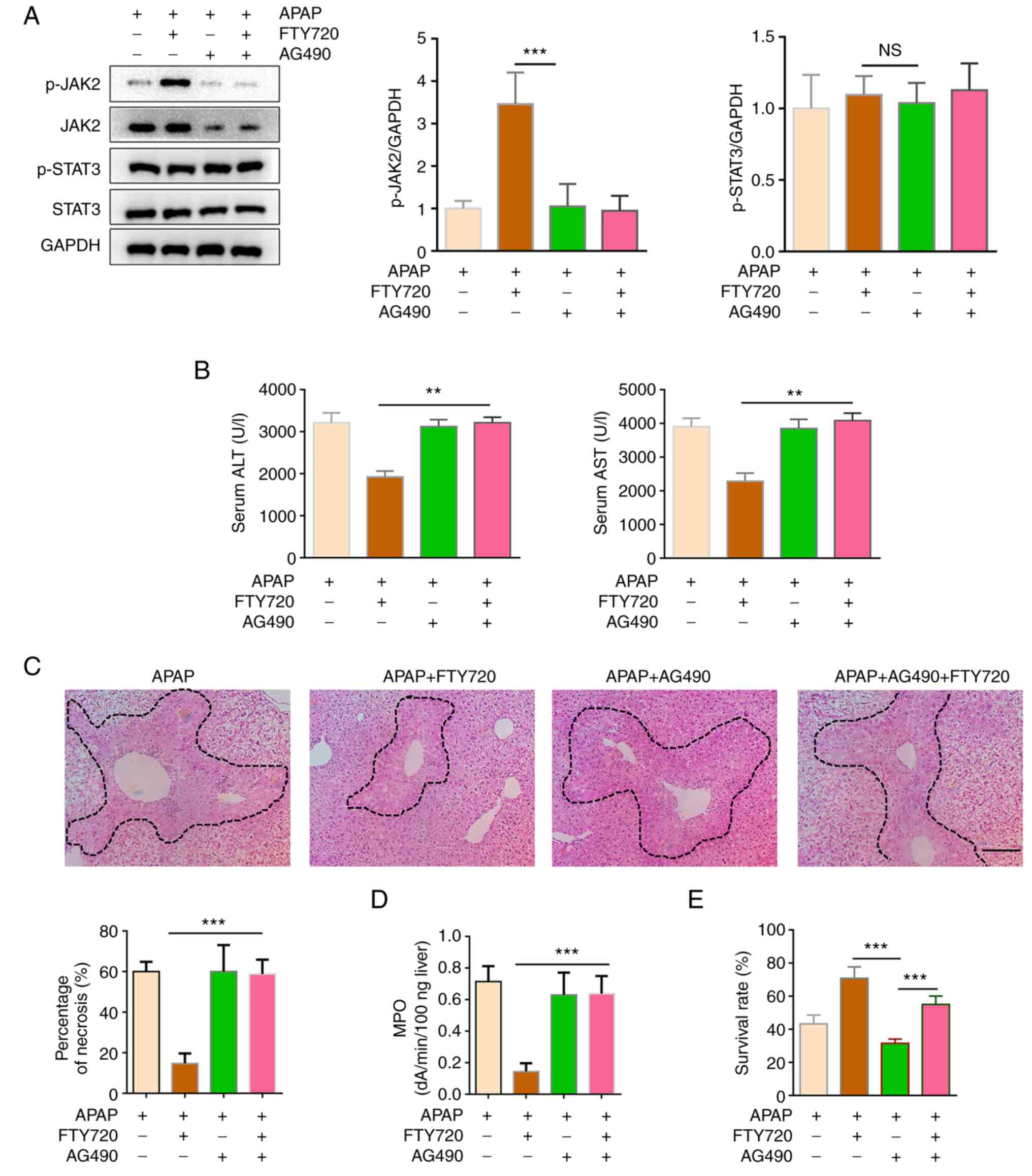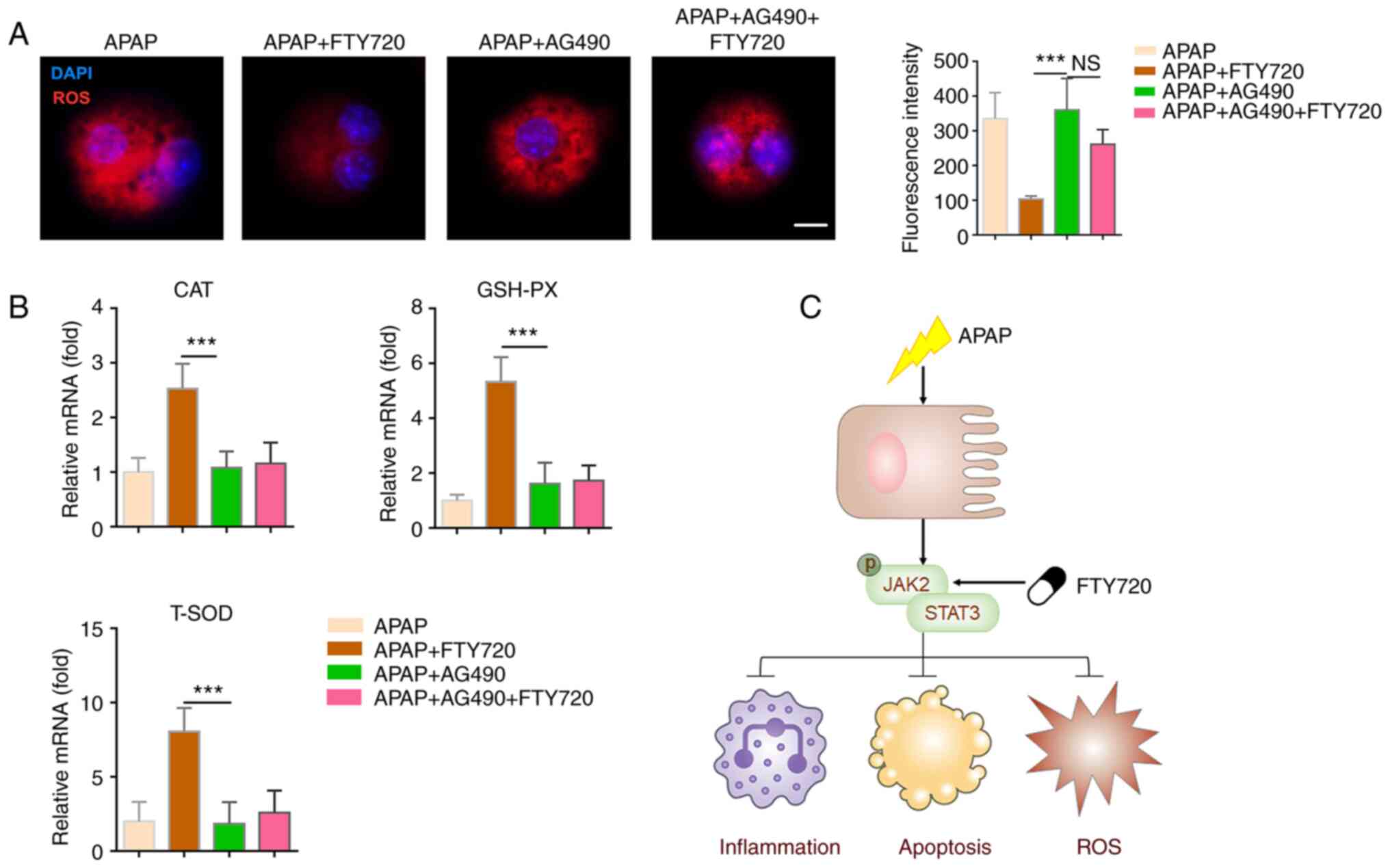|
1
|
Shan S, Shen Z and Song F: Autophagy and
acetaminophen-induced hepatotoxicity. Arch Toxicol. 92:2153–2161.
2018. View Article : Google Scholar : PubMed/NCBI
|
|
2
|
[2] Bernal W and
Wendon J: Acute liver failure. N Engl J Med. 369:2525–2534. 2013.
View Article : Google Scholar : PubMed/NCBI
|
|
3
|
[3]
Bunchorntavakul C and Reddy KR: Acetaminophen (APAP or
N-Acetyl-p-Aminophenol) and acute liver failure. Clin Liver Dis.
22:325–346. 2018. View Article : Google Scholar : PubMed/NCBI
|
|
4
|
[4] Fisher ES and
Curry SC: Evaluation and treatment of acetaminophen toxicity. Adv
Pharmacol. 85:263–272. 2019. View Article : Google Scholar : PubMed/NCBI
|
|
5
|
[5]
Jóźwiak-Bebenista M and Nowak JZ: Paracetamol: Mechanism of action,
applications and safety concern. Acta Pol Pharm. 71:11–23.
2014.
|
|
6
|
[6] Ramachandran
A and Jaeschke H: Acetaminophen toxicity: Novel insights into
mechanisms and future perspectives. Gene Expr. 18:19–30. 2018.
View Article : Google Scholar :
|
|
7
|
[7] Ramachandran
A and Jaeschke H: Acetaminophen hepatotoxicity. Semin Liver Dis.
39:221–234. 2019. View Article : Google Scholar : PubMed/NCBI
|
|
8
|
[8] He Y, Feng D,
Li M, Gao Y, Ramirez T, Cao H, Kim SJ, Yang Y, Cai Y, Ju C, et al:
Hepatic mitochondrial DNA/Toll-like receptor 9/MicroRNA-223 forms a
negative feedback loop to limit neutrophil overactivation and
acetaminophen hepatotoxicity in mice. Hepatology. 66:220–234. 2017.
View Article : Google Scholar : PubMed/NCBI
|
|
9
|
[9] Guo XD, Ji J,
Xue TF, Sun YQ, Guo RB, Cheng H and Sun XL: FTY720 exerts
anti-glioma effects by regulating the glioma microenvironment
through increased CXCR4 internalization by glioma-associated
microglia. Front Immunol. 11:1782020. View Article : Google Scholar : PubMed/NCBI
|
|
10
|
[10] Dragun D,
Fritsche L, Boehler T, Peters H, Budde K and Neumayer HH: FTY720:
Early clinical experience. Transplant Proc. 36(2 Suppl): 544S–548S.
2004. View Article : Google Scholar : PubMed/NCBI
|
|
11
|
[11] Marciniak A,
Camp SM, Garcia JGN and Polt R: An update on
sphingosine-1-phosphate receptor 1 modulators. Bioorg Med Chem
Lett. 28:3585–3591. 2018. View Article : Google Scholar : PubMed/NCBI
|
|
12
|
[12] Cheng X,
Yeung PKK, Zhong K, Zilundu PLM, Zhou L and Chung SK: Astrocytic
endothelin-1 overexpression promotes neural progenitor cells
proliferation and differentiation into astrocytes via the
Jak2/Stat3 pathway after stroke. J Neuroinflammation. 16:2272019.
View Article : Google Scholar : PubMed/NCBI
|
|
13
|
[13] Jo S, Wang
SE, Lee YL, Kang S, Lee B, Han J, Sung IH, Park YS, Bae SC and Kim
TH: IL-17A induces osteoblast differentiation by activating
JAK2/STAT3 in ankylosing spondylitis. Arthritis Res Ther.
20:1152018. View Article : Google Scholar : PubMed/NCBI
|
|
14
|
[14] Zhang L and
Wei W: Anti-inflammatory and immunoregulatory effects of
paeoniflorin and total glucosides of paeony. Pharmacol Ther.
207:1074522020. View Article : Google Scholar
|
|
15
|
[15] Hata T,
Rehman F, Hori T and Nguyen JH: GABA, γ-aminobutyric acid, protects
against severe liver injury. J Surg Res. 236:172–183. 2019.
View Article : Google Scholar : PubMed/NCBI
|
|
16
|
[16] Yu HC, Qin
HY, He F, Wang L, Fu W, Liu D, Guo FC, Liang L, Dou KF and Han H:
Canonical notch pathway protects hepatocytes from
ischemia/reperfusion injury in mice by repressing reactive oxygen
species production through JAK2/STAT3 signaling. Hepatology.
54:979–988. 2011. View Article : Google Scholar : PubMed/NCBI
|
|
17
|
[17] Zai W, Chen
W, Luan J, Fan J, Zhang X, Wu Z, Ding T, Ju D and Liu H:
Dihydroquercetin ameliorated acetaminophen-induced hepatic
cytotoxicity via activating JAK2/STAT3 pathway and autophagy. Appl
Microbiol Biotechnol. 102:1443–1453. 2018. View Article : Google Scholar
|
|
18
|
[18] Freitas MC,
Uchida Y, Zhao D, Ke B, Busuttil RW and Kupiec-Weglinski JW:
Blockade of Janus kinase-2 signaling ameliorates mouse liver damage
due to ischemia and reperfusion. Liver Transpl. 16:600–610. 2010.
View Article : Google Scholar : PubMed/NCBI
|
|
19
|
[19] Zhou HC,
Wang H, Shi K, Li JM, Zong Y and Du R: Hepatoprotective effect of
baicalein against acetaminophen-induced acute liver injury in mice.
Molecules. 24:1312018. View Article : Google Scholar
|
|
20
|
[20] Hong SS,
Choi JH, Lee SY, Park YH, Park KY, Lee JY, Kim J, Gajulapati V, Goo
JI, Singh S, et al: A novel small-molecule inhibitor targeting the
IL-6 receptor β subunit, glycoprotein 130. J Immunol. 195:237–245.
2015. View Article : Google Scholar : PubMed/NCBI
|
|
21
|
[21] Wright MC,
Issa R, Smart DE, Trim N, Murray GI, Primrose JN, Arthur MJ,
Iredale JP and Mann DA: Gliotoxin stimulates the apoptosis of human
and rat hepatic stellate cells and enhances the resolution of liver
fibrosis in rats. Gastroenterology. 121:685–698. 2001. View Article : Google Scholar : PubMed/NCBI
|
|
22
|
[22] Liew PX, Lee
WY and Kubes P: iNKT cells orchestrate a switch from inflammation
to resolution of sterile liver injury. Immunity. 47:752–765.e5.
2017. View Article : Google Scholar : PubMed/NCBI
|
|
23
|
[23] Livak KJ and
Schmittgen TD: Analysis of relative gene expression data using
real-time quantitative PCR and the 2(-Delta Delta C(T)) method.
Methods. 25:402–408. 2001. View Article : Google Scholar
|
|
24
|
[24] Athersuch
TJ, Antoine DJ, Boobis AR, Coen M, Daly AK, Possamai L, Nicholson
JK and Wilson ID: Paracetamol metabolism, hepatotoxicity,
biomarkers and therapeutic interventions: A perspective. Toxicol
Res (Camb). 7:347–357. 2018. View Article : Google Scholar
|
|
25
|
[25] Mitchell JR,
Jollow DJ, Potter WZ, Gillette JR and Brodie BB:
Acetaminophen-induced hepatic necrosis. IV. Protective role of
glutathione. J Pharmacol Exp Ther. 187:211–217. 1973.PubMed/NCBI
|
|
26
|
[26] Giustarini
G, Kruijssen L, van Roest M, Bleumink R, Weaver RJ,
Bol-Schoenmakers M, Smit J and Pieters R: Tissue influx of
neutrophils and monocytes is delayed during development of
trovafloxacin-induced tumor necrosis factor-dependent liver injury
in mice. J Appl Toxicol. 38:753–765. 2018. View Article : Google Scholar : PubMed/NCBI
|
|
27
|
[27] Lesiński W,
Mnich K, Golińska AK and Rudnicki WR: Integration of human cell
lines gene expression and chemical properties of drugs for drug
induced liver injury prediction. Biol Direct. 16:22021. View Article : Google Scholar
|
|
28
|
[28] Kong X, Guo
D, Liu S, Zhu Y and Yu C: Incidence, characteristics and risk
factors for drug-induced liver injury in hospitalized patients: A
matched case-control study. Br J Clin Pharmacol. 87:4304–4312.
2021. View Article : Google Scholar : PubMed/NCBI
|
|
29
|
[29] Katarey D
and Verma S: Drug-induced liver injury. Clin Med (Lond). 16(Suppl
6): S104–S109. 2016. View Article : Google Scholar
|
|
30
|
[30] Fisher K,
Vuppalanchi R and Saxena R: Drug-induced liver injury. Arch Pathol
Lab Med. 139:876–887. 2015. View Article : Google Scholar : PubMed/NCBI
|
|
31
|
[31] Shen T, Liu
Y, Shang J, Xie Q, Li J, Yan M, Xu J, Niu J, Liu J, Watkins PB, et
al: Incidence and etiology of drug-induced liver injury in mainland
China. Gastroenterology. 156:2230–2241.e11. 2019. View Article : Google Scholar : PubMed/NCBI
|
|
32
|
[32] Jaeschke H,
Murray FJ, Monnot AD, Jacobson-Kram D, Cohen SM, Hardisty JF,
Atillasoy E, Hermanowski-Vosatka A, Kuffner E, Wikoff D, et al:
Assessment of the biochemical pathways for acetaminophen toxicity:
Implications for its carcinogenic hazard potential. Regul Toxicol
Pharmacol. 120:1048592021. View Article : Google Scholar : PubMed/NCBI
|
|
33
|
[33] Papp S,
Moderzynski K, Rauch J, Heine L, Kuehl S, Richardt U, Mueller H,
Fleischer B and Osterloh A: Liver necrosis and lethal systemic
inflammation in a murine model of rickettsia typhi Infection: Role
of neutrophils, macrophages and NK cells. PLoS Negl Trop Dis.
10:e00049352016. View Article : Google Scholar : PubMed/NCBI
|
|
34
|
[34] Ishitsuka Y,
Kondo Y and Kadowaki D: Toxicological property of acetaminophen:
The dark side of a safe antipyretic/analgesic drug. Biol Pharm
Bull. 43:195–206. 2020. View Article : Google Scholar
|
|
35
|
[35] Zhang L, Gao
H, Yang L, Liu T, Zhang Q, Xun J, Li C, Cui L and Wang X: FTY720
induces neutrophil extracellular traps via a NADPH
oxidase-independent pathway. Arch Biochem Biophys. 711:1090152021.
View Article : Google Scholar : PubMed/NCBI
|
|
36
|
[36] King A,
Houlihan DD, Kavanagh D, Haldar D, Luu N, Owen A, Suresh S, Than
NN, Reynolds G, Penny J, et al: Sphingosine-1-phosphate prevents
egress of hematopoietic stem cells from liver to reduce fibrosis.
Gastroenterology. 153:233–248.e16. 2017. View Article : Google Scholar : PubMed/NCBI
|
|
37
|
[37] Sharma N,
Akhade AS and Qadri A: Sphingosine-1-phosphate suppresses
TLR-induced CXCL8 secretion from human T cells. J Leukoc Biol.
93:521–528. 2013. View Article : Google Scholar : PubMed/NCBI
|
|
38
|
[38] Liang YJ,
Luo J, Lu Q, Zhou Y, Wu HW, Zheng D, Ren YY, Sun KY, Wang Y and
Zhang ZS: Gene profile of chemokines on hepatic stellate cells of
schistosome-infected mice and antifibrotic roles of CXCL9/10 on
liver non-parenchymal cells. PLoS One. 7:e424902012. View Article : Google Scholar : PubMed/NCBI
|
|
39
|
[39] Herz J,
Köster C, Crasmöller M, Abberger H, Hansen W, Felderhoff-Müser U
and Bendix I: Peripheral T cell depletion by FTY720 exacerbates
hypoxic-ischemic brain injury in neonatal mice. Front Immunol.
9:16962018. View Article : Google Scholar : PubMed/NCBI
|
|
40
|
[40] Sola A,
Weigert A, Jung M, Vinuesa E, Brecht K, Weis N, Brüne B, Borregaard
N and Hotter G: Sphingosine-1-phosphate signalling induces the
production of Lcn-2 by macrophages to promote kidney regeneration.
J Pathol. 225:597–608. 2011. View Article : Google Scholar : PubMed/NCBI
|
|
41
|
[41] Tsai HC and
Han MH: Sphingosine-1-Phosphate (S1P) and S1P signaling pathway:
Therapeutic targets in autoimmunity and inflammation. Drugs.
76:1067–1079. 2016. View Article : Google Scholar : PubMed/NCBI
|
|
42
|
[42] Zhao M, Yang
C, Chai S, Yuan Y, Zhang J, Cao P, Wang Y, Xiao X, Wu K, Yan H, et
al: Curcumol and FTY720 synergistically induce apoptosis and
differentiation in chronic myelomonocytic leukemia via multiple
signaling pathways. Phytother Res. 35:2157–2170. 2021. View Article : Google Scholar
|
|
43
|
[43] Takai K,
Takahara S, Isoyama N, Tsuchida M, Matsumura M, Kishi Y, Uchiyama K
and Naito K: Effects of FTY720 on rat lymphoid organs. Transplant
Proc. 36:2453–2456. 2004. View Article : Google Scholar : PubMed/NCBI
|
|
44
|
[44] Nagahara Y,
Enosawa S, Ikekita M, Suzuki S and Shinomiya T: Evidence that
FTY720 induces T cell apoptosis in vivo. Immunopharmacology.
48:75–85. 2000. View Article : Google Scholar
|
|
45
|
[45] Tuckermann
JP, Kleiman A, McPherson KG and Reichardt HM: Molecular mechanisms
of glucocorticoids in the control of inflammation and lymphocyte
apoptosis. Crit Rev Clin Lab Sci. 42:71–104. 2005. View Article : Google Scholar : PubMed/NCBI
|
|
46
|
[46]
Sordo-Bahamonde C, Lorenzo-Herrero S, Payer ÁR, Gonzalez S and
López-Soto A: Mechanisms of apoptosis resistance to NK
cell-mediated cytotoxicity in cancer. Int J Mol Sci. 21:37262020.
View Article : Google Scholar :
|
|
47
|
[47] Jiang J,
Huang X, Wang Y, Deng A and Zhou J: FTY720 induces cell cycle
arrest and apoptosis of rat glomerular mesangial cells. Mol Biol
Rep. 39:8243–8250. 2012. View Article : Google Scholar : PubMed/NCBI
|
|
48
|
[48] Chen J,
Zhang C, Li S, Li Z, Lai X and Xia Q: Exosomes derived from nerve
stem cells loaded with FTY720 promote the recovery after spinal
cord injury in rats by PTEN/AKT signal pathway. J Immunol Res.
2021:81002982021. View Article : Google Scholar : PubMed/NCBI
|
|
49
|
[49] Hu Z, Han Y,
Liu Y, Zhao Z, Ma F, Cui A, Zhang F, Liu Z, Xue Y, Bai J, et al:
CREBZF as a key regulator of STAT3 pathway in the control of liver
regeneration in mice. Hepatology. 71:1421–1436. 2020. View Article : Google Scholar
|
|
50
|
[50] Ozaki M:
Cellular and molecular mechanisms of liver regeneration:
Proliferation, growth, death and protection of hepatocytes. Semin
Cell Dev Biol. 100:62–73. 2020. View Article : Google Scholar
|
|
51
|
[51] Zegeye MM,
Lindkvist M, Fälker K, Kumawat AK, Paramel G, Grenegård M, Sirsjö A
and Ljungberg LU: Activation of the JAK/STAT3 and PI3K/AKT pathways
are crucial for IL-6 trans-signaling-mediated pro-inflammatory
response in human vascular endothelial cells. Cell Commun Signal.
16:552018. View Article : Google Scholar : PubMed/NCBI
|
|
52
|
[52] Foster AD,
Vicente D, Clark N, Leonhardt C, Elster EA, Davis TA and Bradley
MJ: FTY720 effects on inflammation and liver damage in a rat model
of renal ischemia-reperfusion injury. Mediators Inflamm.
2019:34968362019. View Article : Google Scholar : PubMed/NCBI
|
|
53
|
[53] Zhao Y, Man
K, Lo CM, Ng KT, Li XL, Sun CK, Lee TK, Dai XW and Fan ST:
Attenuation of small-for-size liver graft injury by FTY720:
Significance of cell-survival Akt signaling pathway. Am J
Transplant. 4:1399–1407. 2004. View Article : Google Scholar : PubMed/NCBI
|
|
54
|
[54] Kaneko T,
Murakami T, Kawana H, Takahashi M, Yasue T and Kobayashi E:
Sphingosine-1-phosphate receptor agonists suppress concanavalin
A-induced hepatic injury in mice. Biochem Biophys Res Commun.
345:85–92. 2006. View Article : Google Scholar : PubMed/NCBI
|















